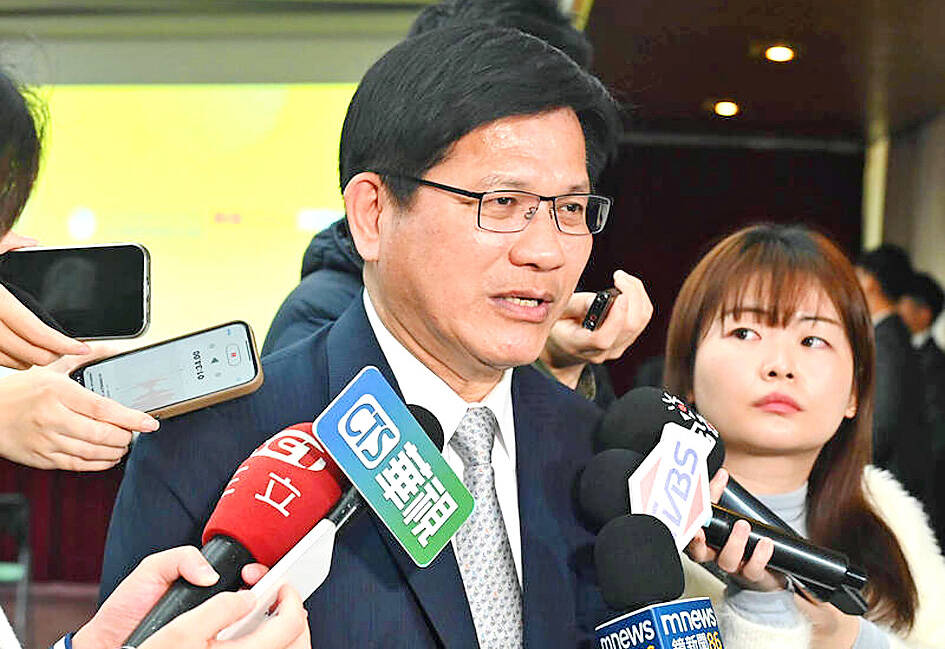Peace and stability in the Taiwan Strait is an international consensus and of common interest, Minister of Foreign Affairs Lin Chia-lung (林佳龍) said yesterday as he welcomed top diplomats from the US, Japan and South Korea reiterating in a joint statement the importance of maintaining peace and stability across the Taiwan Strait.
US Secretary of State Marco Rubio, Japanese Minister of Foreign Affairs Takeshi Iwaya and South Korean Minister of Foreign Affairs Cho Tae-yul on Saturday held their first meeting following the inauguration of US President Donald Trump on the sidelines of the Munich Security Conference in Germany.
Following their meeting, the US Department of State released a “Joint Statement on the Trilateral United States – Japan – Republic of Korea Meeting in Munich.”

Photo: Taipei Times
The statement said that the secretary and foreign ministers “emphasized the importance of maintaining peace and stability across the Taiwan Strait as an indispensable element of security and prosperity for the international community.”
“They encouraged the peaceful resolution of cross-strait issues and opposed any attempts to unilaterally force or coerce changes to the status quo,” it said, adding that “they expressed support for Taiwan’s meaningful participation in appropriate international organizations.”
The statement also said they “emphasized their commitment to maintaining a free and open Indo-Pacific and ensuring international law prevails.”
Rubio, Iwaya and Cho “reaffirmed their commitment to upholding shared principles, including respect for democracy, sovereignty and the rule of law” and “made clear they stand shoulder to shoulder against any effort to destabilize democratic institutions, economic independence and global security.”
In Taipei, the Ministry of Foreign Affairs (MOFA) in a news release cited Lin as saying that the ministry welcomes and thanks the three top diplomats for jointly reiterating their support for peace and stability across the Taiwan Strait, and their opposition to any attempts to unilaterally force or coerce changes to the “status quo.”
The joint statement came on the heels of the “US-Japan Leaders’ Joint Statement” issued after Trump met with Japanese Prime Minister Ishiba Shigeru in Washington earlier this month, the ministry said.
Like-minded partners have again highlighted that maintaining peace and stability across the Taiwan Strait has become a consensus and common interest of the international community, and is relevant to the welfare of all countries, as well as regional and global peace and prosperity, it said.
The ministry welcomes the international community paying close attention to peace and stability across the Taiwan Strait, and showing concern about China’s use of “gray zone” tactics and economic coercion to threaten the “status quo” in the area, it said.
As a responsible member of the international community, Taiwan would continue to strengthen national defense capabilities and economic resilience, and coordinate closely with like-minded nations to ensure peace, stability and prosperity across the Taiwan Strait and throughout the Indo-Pacific region, the ministry said.

INVESTIGATION: The case is the latest instance of a DPP figure being implicated in an espionage network accused of allegedly leaking information to Chinese intelligence Democratic Progressive Party (DPP) member Ho Jen-chieh (何仁傑) was detained and held incommunicado yesterday on suspicion of spying for China during his tenure as assistant to then-minister of foreign affairs Joseph Wu (吳釗燮). The Taipei District Prosecutors’ Office said Ho was implicated during its investigation into alleged spying activities by former Presidential Office consultant Wu Shang-yu (吳尚雨). Prosecutors said there is reason to believe Ho breached the National Security Act (國家安全法) by leaking classified Ministry of Foreign Affairs information to Chinese intelligence. Following interrogation, prosecutors petitioned the Taipei District Court to detain Ho, citing concerns over potential collusion or tampering of evidence. The

Seventy percent of middle and elementary schools now conduct English classes entirely in English, the Ministry of Education said, as it encourages schools nationwide to adopt this practice Minister of Education (MOE) Cheng Ying-yao (鄭英耀) is scheduled to present a report on the government’s bilingual education policy to the Legislative Yuan’s Education and Culture Committee today. The report would outline strategies aimed at expanding access to education, reducing regional disparities and improving talent cultivation. Implementation of bilingual education policies has varied across local governments, occasionally drawing public criticism. For example, some schools have required teachers of non-English subjects to pass English proficiency

‘FORM OF PROTEST’: The German Institute Taipei said it was ‘shocked’ to see Nazi symbolism used in connection with political aims as it condemned the incident Sung Chien-liang (宋建樑), who led efforts to recall Democratic Progressive Party (DPP) Legislator Lee Kun-cheng (李坤城), was released on bail of NT$80,000 yesterday amid an outcry over a Nazi armband he wore to questioning the night before. Sung arrived at the New Taipei City District Prosecutors’ Office for questioning in a recall petition forgery case on Tuesday night wearing a red armband bearing a swastika, carrying a copy of Adolf Hitler’s Mein Kampf and giving a Nazi salute. Sung left the building at 1:15am without the armband and apparently covering the book with a coat. This is a serious international scandal and Chinese

TRADE: The premier pledged safeguards on ‘Made in Taiwan’ labeling, anti-dumping measures and stricter export controls to strengthen its position in trade talks Products labeled “made in Taiwan” must be genuinely made in Taiwan, Premier Cho Jung-tai (卓榮泰) said yesterday, vowing to enforce strict safeguards against “origin laundering” and initiate anti-dumping investigations to prevent China dumping its products in Taiwan. Cho made the remarks in a discussion session with representatives from industries in Kaohsiung. In response to the US government’s recent announcement of “reciprocal” tariffs on its trading partners, President William Lai (賴清德) and Cho last week began a series of consultations with industry leaders nationwide to gather feedback and address concerns. Taiwanese and US officials held a videoconference on Friday evening to discuss the